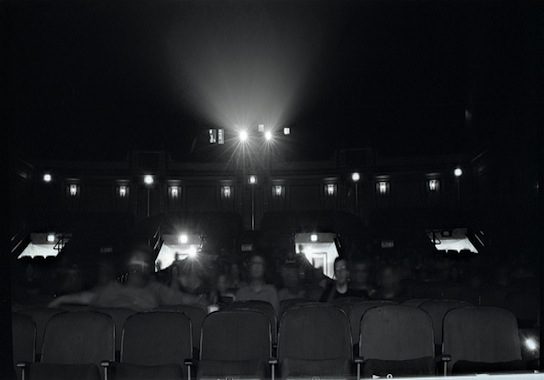How to Watch A Movie

Should there be rules about how we conduct ourselves in movie theaters? The debate ratcheted up this week, after tech blogger Hunter Walk suggested theaters should allow audiences to use other media. He wants “the ability to multitask” and suggested theaters offer more light, wifi, electricity outlets, and even a second screen experience. Anil Dash agreed, adding that “shushers” are a “textbook case of cultural conservatism” whose arguments are akin to those stating “women should not wear pants, or defending slavery…” He sounds rather like a modern Punchinello, crying to theater snobs, “Possibly it may disturb your neighbors; but you do not ask them to hear it … Isn’t this a free country?”
It’s true that the idea of sitting quietly and watching a performance is rather antiquated. It used to be a sign of respect – not merely to fellow observers, but also to artists themselves. Classical musicians were prone to “shush” audiences who clapped at the wrong moment. You can only imagine the outrage expressed when ringing, buzzing phones appeared on the scene. They believed their hard work and skill should command a level of audience respect. But Walk and Dash belong to a generation that rarely experiences this classical culture. They have likely never attended a ballet, opera, or orchestral performance. Most Americans live in a world where every entertaining event is accompanied by Instagram, Facebook, and Twitter. If Americans can tweet at rock concerts and rodeos, why not at the movie theater? Moreover, movies are not live events, which understandably impedes any sense of “respect” one feels for absentee actors and director.
However, Atlantic Wire’s Richard Dawson believes silence is more than artistic “respect” – it is an act of community: “Dash says the shushers are trying to block out the world, when I think it’s the opposite. Being considerate of those around you — recognizing that they might want to watch a movie in the quiet dark — is an act of communion.” Quiet consideration thus defined requires accepting and respecting the place you inhabit. Ballet reviewer Reese Thompson compared theater and ballet to a waltz between artists and audience. A lack of audience energy or participation dynamically affects the quality of the performance. No one, she writes, “whether they’re watching a comic perform in a bar or sitting in the orchestra section of the Metropolitan Opera,” should ever answer their cell phone during a performance.
In the age of distraction, it’s hard to reject multitasking and outward-connecting. But Fast Company writer Laura Vanderkam argues “monotasking” is key to conscientious flourishing, and she encouraged readers to embrace focus once more. To “monotask” during an artistic event (be it movie or concert) is an act of simple respect. But it is also something more: it is a moment of community between audience members, in which they allow their imaginations to become entranced with another world. As a child, I remember losing myself so completely in a movie, I emerged feeling slightly foreign in my own skin. But that sort of enchantment is harder nowadays; you never know when your neighbor might break the spell with a text or phone call.
Comments